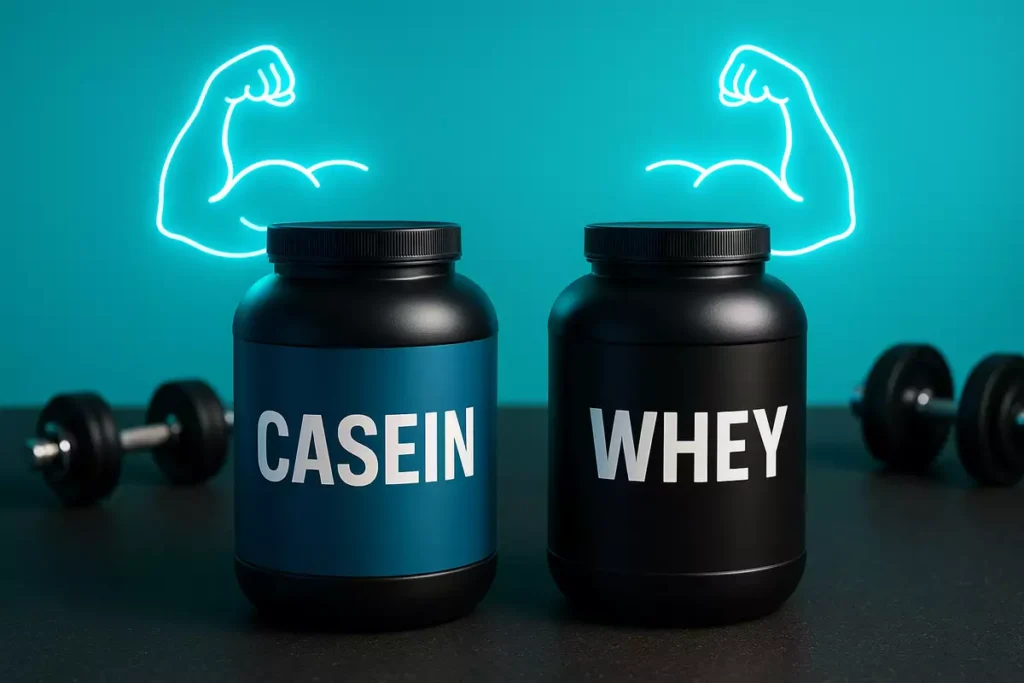Casein protein has been surrounded by myths for years—some so common that many lifters accept them without question.
From “it makes you gain fat” to “it’s only for bedtime,” these claims have discouraged countless people from using one of the most effective slow-digesting proteins available.
As a fitness trainer with over six years of experience using casein myself and integrating it into my clients’ plans, I’ve seen the real story. And science backs it up.
In this article, we’ll separate fact from fiction, crush the biggest casein protein myths, and show you how to use it to boost recovery, muscle growth, and overall health.
Table of contents
Is Casein Protein Misunderstood?
Yes, casein protein is often misunderstood. Many myths you hear online are either outdated or completely false.
As a trainer with over six years of personal use and countless client experiences, I can say with confidence that casein is a powerful tool for muscle recovery, appetite control, and long-term progress—if you know how to use it right.
For more on when to take it for the best results, check out Best Time to Take Casein Protein for Muscle Growth.
Myth #1 – Casein Causes Unwanted Fat Gain

Some people believe casein makes you gain fat because it’s “slow-digesting.”
In reality, fat gain comes from eating more calories than you burn—no matter the protein source.
In my own fat loss phases, I’ve relied on casein to actually help prevent overeating. For example, one of my clients, Mark from Canada, was struggling with late-night cravings. I added a casein shake to his bedtime routine, and in six weeks, he dropped 4 kg without feeling deprived.
Casein can even work as a strategic meal replacement when needed—learn more in Casein Protein as a Meal Replacement Guide.
Myth #2 – Casein Is Only for Bedtime
It’s true that casein works wonderfully before bed because it releases amino acids slowly.
I take mine at night most of the time, especially after evening workouts, so my muscles get a steady stream of nutrients while I sleep.
But that doesn’t mean you can’t have it at other times. I sometimes use it in the afternoon if I know I won’t eat for hours. One of my clients, Sara from Italy, uses casein as a mid-day pudding at work—it keeps her full until dinner.
For other smart uses beyond bedtime, see Casein vs. Egg Protein for Nighttime Nutrition.
Myth #3 – Casein Is Inferior to Whey for Muscle Growth

Whey is fast-digesting, casein is slow. Both have their place.
Research shows casein supports muscle protein synthesis over a longer period, making it a perfect partner to whey.
From my own training, I’ve found whey great for immediate recovery, but when I want to wake up with less muscle soreness, casein wins. Using both strategically gives you the best of both worlds.
If you’re comparing slow-digesting proteins, check out Casein vs. Soy Protein for Slow Digestion.
Myth #4 – Casein Leads to Digestive Problems in Everyone
Some people avoid casein because they’ve heard it causes bloating.
While it’s possible for lactose-intolerant individuals to react, most people tolerate it just fine—especially if they choose high-quality, low-lactose brands.
One of my clients, Laura from Spain, experienced mild bloating during her first week. We simply reduced her serving size, and the discomfort vanished.
Myth #5 – Casein Is Only for Bodybuilders

This is one of the most limiting myths.
I’ve seen casein help a wide range of people—from competitive athletes to busy parents. Sara, who doesn’t even go to the gym, uses it to maintain muscle tone while keeping her diet high in protein.
It’s just as effective for weight loss, recovery from sports, and supporting healthy aging. In fact, women can benefit just as much as men—see Casein Protein Benefits for Women in Fitness.
Final Takeaway – Choosing Casein Wisely
Casein isn’t a magic powder, but it’s a versatile, science-backed supplement that can boost your progress.
If you train in the evenings, struggle with late-night cravings, or want a steady supply of amino acids, it’s worth adding to your routine.
I personally trust brands like Optimum Nutrition and MyProtein for quality, taste, and consistency. Whether you blend it into oats, turn it into a pudding, or just shake it up before bed, casein can be a game-changer—when used with the right expectations and in balance with your nutrition plan.
If you’re curious about how long it takes to see results, read How Long to See Results with Casein Protein. And if you want the best options, see Top-Rated Casein Protein for Bodybuilding.



Leave a Reply